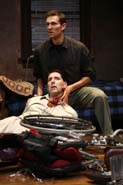
Paulanne Simmons
''The Rules of Charity''
Explores the Complexities of Passion and Compassion
''The Rules of Charity''
Directed by Ike Schambelan
Theatre Row - The Lion, 410 West 42nd St.
Opened May 26, 2007
Wed. & Thurs. 7 p.m., Fri. & Sat. 8 p.m., matinees Sat. &
Sun. 3 p.m.
$40 (212) 279-4200
Closes June 24, 2007
Reviewed by Paulanne Simmons June 8, 2007
 |
Brian Bielawski (above) and Nicholas Viselli. Photo by: Carol Rosegg. |
According to Theater by the Blind, the producers of the late playwright John Belluso's ''The Rules of Charity,'' the disabled population of over 51 million is the largest minority in the country. The isolation and loneliness of these people must at times be unbearable, but in order to strengthen this point, Belluso makes his hero, Monty, not only confined to a wheelchair, but also a closeted gay man. As Paz, a.k.a. Joyce (Hollis Hamilton) says when presenting her documentary project (to be called ''The Rules of Charity'') to Monty, ''There are black Jews, lesbian Filipinos; why not a disabled gay guy?''
Why not indeed! Despite (or perhaps because of) its atypical subject matter, ''The Rules of Charity'' is a tremendously moving drama as well as a dark comedy. It explores those hidden corners most where people do not want to go, the places where love and hate, cruelty and goodness exist side by side.
Monty (Christopher Hurt) is a widower who is totally dependent on his young daughter, Loretta (Pamela Sabaugh) and the social security checks he receives from the government. For some reason, never totally explained, Monty is in the habit of throwing himself out of bed in the middle of the night. When his daughter wakes up and puts him back to bed she hits him, yells at him and is subsequently filled with remorse.
The only cheerful moments of Monty's life arrive with L.H. (Nicholas Viselli), the building's super, who is eager to learn from Monty, a self-taught scholar with a great sense of humor. Monty and Horace, it is revealed, have become lovers some time before the beginning of the play.
But it soon turns out that L.H. is not as simple and sincere as Monty believed. And when Loretta finds herself a live-in boyfriend, the homeless and unemployed Horace (Brian Bielawski), Monty has nothing left in his life but memories and the journal he has faithfully kept throughout the years, a journal which both Horace and Loretta, for different reasons, want.
 |
| Christopher Hurt & Pamela Sabaugh. Photo by: Carol Rosegg. |
''The Rules of Charity'' is filled with parallel couples who have love/hate relationships: L.H. loves Monty but has no intention of living the life of a ''faggot.'' Loretta is devoted to Monty. She refuses to put him in a nursing home, but is overwhelmed by his needs and angry at the limitations they put on her life. Horace loves Loretta, but he is not capable of getting his life together to give their relationship a future.
In keeping with its mission of producing theater by and for the disabled, Theater by the Blind incorporates into the play a narrator (Gregg Mozgala) who describes scenes for the sightless. Far from an intrusion, Mozgala's narration expands and explores what's happening onstage. If anything, it gives the audience more reason to think about the decisions director Ike Schambelan has made and why he has made them.
''The Rules of Charity'' occupies a space somewhere between harsh reality and fantasy, and Schambelan is careful to keep the two worlds coexisting and interacting. Hurt, for his part, was so utterly believable as Monty this reviewer was not sure whether or not the actor is really disabled. But Loretta's relationship with Horace, despite its emotional intensity, often seems to be created by the lovers' imaginations. And Paz floats in and out of the story like a cartoon character when needed.
None of this, however, detracts from the power of the play. In fact it is what makes the play so terribly sad and funny. ''The Rules of Tragedy'' is emphatically not the documentary Paz never completes. It is not about the physical challenges disabled people face every day, but rather the emotional vulnerability they share with everyone, disabled or not.

| lobby | search
| home | cue-to-cue |
discounts | welcome | film
| dance | reviews |
| museums | NYTW
mail | recordings | coupons |
publications | classified |